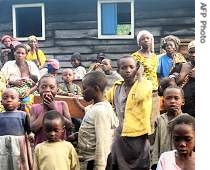-
(单词翻译:双击或拖选)
Dakar
05 September 2007
Residents in eastern Congo say the United Nations peacekeeping mission is not doing enough to stop the clashes that erupted this week between the army and renegade forces. The fighting has left dozens dead, and forced thousands of people to flee eastern villages. Selah Hennessy has this report from our VOA West and Central Africa bureau in Dakar.
Julien Paluku is the governor of the eastern region North Kivu, which has been at the center of the unrest.
He said on Wednesday some citizens in the town of Sake formed a blockade, refusing to allow U.N. troops from the peacekeeping force MONUC to leave.
He says the population was angry because they thought the MONUC troops were returning to their barracks while there was still fighting going on.
The citizens said that the troops should return to where the fighting was taking place.
Paluku says it is important that the population has trust in the U.N. and that everyone works together to bring calm to the region.
MONUC military spokesman Gabriel de Brosses says people must understand that U.N. troops do not have a mandate1 to engage in combat.
"The population expectation is to see probably MONUC playing a more offensive role on the terrain2 but that is definitely not our mandate," said Brosses. "We are not carrying out joint3 operations with the Congolese army."
 |
| Women and children after they fled their homes in fear due to fighting between the regular army and renegade troops in the DRC region of North Kivu, 03 Sep 2007 |
De Brosses says fighting has intensified6 in recent days and he says dissident fighters instigated7 the conflict. The clashes follow failed attempts in the east to integrate Congo's different brigades into a unified8, post-conflict army.
Renegade factional leader Laurent Nkunda, a former general in the Congolese army, says the government is attacking his forces without provocation9.
"We were in a peace process since January but in the past week we were surprised by an attack on our forces by the government forces," said Nkunda.
Nkunda says he wants peace in the country but the government has refused to negotiate. He also says local ethnic10 Tutsi populations are being attacked by former ethnic Hutu rebels from Rwanda, which Congo's army has been unable to get rid of. Now, he says, his men are defending themselves.
"We decided11 to protect ourselves and our people and we must die in it even if we are not capable to do many things," he said.
The U.N. peacekeeping mission says up to 10,000 people have fled to Uganda since the recent wave of fighting broke out. U.N. officials have warned that should fighting continue, this number could swell12 to over 300,000.
 收听单词发音
收听单词发音
1
mandate

|
|
| n.托管地;命令,指示 | |
参考例句: |
|
|
|
2
terrain

|
|
| n.地面,地形,地图 | |
参考例句: |
|
|
|
3
joint

|
|
| adj.联合的,共同的;n.关节,接合处;v.连接,贴合 | |
参考例句: |
|
|
|
4
ammunition

|
|
| n.军火,弹药 | |
参考例句: |
|
|
|
5
evacuate

|
|
| v.遣送;搬空;抽出;排泄;大(小)便 | |
参考例句: |
|
|
|
6
intensified

|
|
| v.(使)增强, (使)加剧( intensify的过去式和过去分词 ) | |
参考例句: |
|
|
|
7
instigated

|
|
| v.使(某事物)开始或发生,鼓动( instigate的过去式和过去分词 ) | |
参考例句: |
|
|
|
8
unified

|
|
| (unify 的过去式和过去分词); 统一的; 统一标准的; 一元化的 | |
参考例句: |
|
|
|
9
provocation

|
|
| n.激怒,刺激,挑拨,挑衅的事物,激怒的原因 | |
参考例句: |
|
|
|
10
ethnic

|
|
| adj.人种的,种族的,异教徒的 | |
参考例句: |
|
|
|
11
decided

|
|
| adj.决定了的,坚决的;明显的,明确的 | |
参考例句: |
|
|
|
12
swell

|
|
| vi.膨胀,肿胀;增长,增强 | |
参考例句: |
|
|
|















